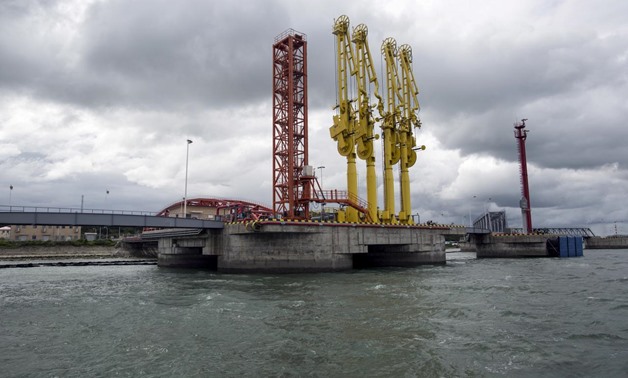
FILE PHOTO: A jetty for oil tankers is seen on Madae island, Kyaukpyu township, Rakhine state, Myanmar October 7, 2015. REUTERS/Soe Zeya Tun/File Photo
SINGAPORE - 23 April 2018: Oil prices dipped on Monday as a rising U.S. rig count implied further increases in output, marking one of the few factors tamping back crude in an otherwise bullish environment.
Brent crude futures were at $73.91 per barrel at 0630 GMT, down 15 cents, or 0.2 percent from their last close.
U.S. West Texas Intermediate (WTI) crude futures were down 18 cents, or 0.3 percent, at $68.22 a barrel.
“We expect for oil prices to recede slightly today as market anticipates on the prospect of rising production in the U.S.,” Singapore-based Phillip Futures said on Monday.
U.S. drillers added five rigs drilling for new production in the week ended April 20, bringing the total to 820, the highest since March 2015, according Baker Hughes energy services firm.
The rising rig numbers point to further increases in U.S. crude production, which is already up by a quarter since mid-2016 to a record 10.54 million barrels per day (bpd).
Only Russia produces more, at almost 11 million bpd.
Despite slipping on Monday, overall the oil market remains well supported, especially by strong demand in Asia.
Brent is up by 20 percent from its 2018 low in February.
Prices are also being supported by supply cuts led by the Organization of the Petroleum Exporting Countries (OPEC) that were introduced in 2017 to prop up the market.
“Added price pressure comes from U.S. sanctions against the key oil exporting nations of Venezuela, Russia and Iran,” said J.P. Morgan Asset Management Global Market Strategist Kerry Craig. He was referring to action the U.S. government has taken on Russian companies and individuals, as well as on potential new measures against struggling Venezuela and especially OPEC-member Iran.
“Stay long oil,” J.P. Morgan said in a separate note.
The United States has until May 12 to decide whether it will leave the Iran nuclear deal and instead impose new sanctions against Tehran, including potentially on its oil exports, which would further tighten global supplies.
The U.S. trade action against Russia and, potentially, against Iran has resulted in a slump in Russia’s ruble and Iran’s rial.
This means costs for any imported goods become more expensive for its citizens or companies, but it has also pushed up the value of Russia’s and Iran’s oil sales as all of their production costs are in the local currencies, while foreign sales are largely made in the U.S. dollar.
The generally elevated oil prices have also sparked a spat between U.S. President Donald Trump and producer cartel OPEC.
Trump on Friday accused OPEC of “artificially” boosting oil prices, threatening on Twitter that this “will not be accepted”, drawing rebukes from several of the world’s top oil exporters within OPEC.


Comments
Leave a Comment